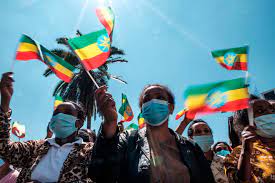ETHIOPIA IS FRAGILE.
A year ago, Prime Minister Abiy Ahmed began a military campaign in the Tigray region of the Federal Democratic Republic of Ethiopia. This comes after he was lauded as a regional peacemaker in 2019 for receiving a Nobel Peace Prize in honour of his role in ending a long-running strife with Eritrea, a neighbouring country. He also made remarkable reforms in Ethiopia. How did this country in the Horn of Africa get here?
Africa’s second most populous state can be described as fragile due to the persisting conflict rampaging the Eastern African country. Ethiopia is made up of 10 regions governed by different ethnic groups. Regional governments are mostly divided along these entrenched ethnic lines. Before Abiy became Prime Minister, the Tigray People Liberation Front (T.P.L.F), a four- party coalition ruled Ethiopia for nearly three decades. It was a period of stability and economic growth at the expense of infringing basic civil and political rights. The Tigray People Liberation Front (T.P.L.F) is a political group of rebels which transitioned from rebels to rulers. Prime Minister Abiy, who was once a former intelligence officer with the group through his rise in his Ministerial role appeared, bent on breaking the power the T.P.L.F possesses. The group’s dictatorial rule incited an uprising that eventually forced Abiy's predecessor, Hailemariam Desalegn, to step down. From the time when Abiy took office in 2018, he has been fixated on draining T.P.L.F’s influence in Ethiopia. The Tigrayan leadership found his act infuriating because his appointment was to quell tensions and bring about a transformation, without disrupting the old political order.
The feud between Abiy and the T.P.L.F has heightened economic, ethnic and political challenges in Ethiopia. Abiy’s action has caused fear of threat in some regions with significant autonomy like that of Tigray. In September 2020, the regional government in Tigray went ahead to conduct regional parliamentary elections which has been stalled due to the COVID-19 pandemic. The voting exercise was considered unlawful and as a result, the T.P.L.P leadership received no funding whatsoever from lawmakers. It created hostility between the two sides, spreading to other areas in Ethiopia. The conflict has caused atrocities, famine, displaced many from their homes as well as killed thousands of civilians. Ethiopia is at risk of collapse as fighters from Tigray charge towards the capital, Addis Ababa. Also, there is a mounting fear of destabilization in the Horn of Africa region.
Presently, the animosity existing between the central government and the regional leadership in Tigray spreads to the Eritrean government as they showed support to Prime Minister Abiy by offering their troops in the fight. Prior to this, Ethiopia and Eritrea had experienced a border dispute that resulted in a war from 1998 to 2000. Prime Minister stepped in to smoothen out things, earning him the Honorary Noble Prize. Some countries like the United States and United Kingdom informed their citizens to leave the country. Early November this year, at least 16 United Nation (UN) workers were detained while another 6 were held and released with no valid reason. The implications of the next move either by the central government or regional government could be very volatile for Ethiopia and the rest of the world. Both sides are not retreating. There are claims of strategic interest. As a stable Western ally in the region, neighbouring countries and even those farther off could get sucked in if this strife continues. The multi-ethic nation fears a break away. There has been a call for dialogue between the two sides amidst economic sanctions and even visa restrictions for Ethiopian and Eritrean officials by the United States government should the issue escalate.


Comments
Post a Comment